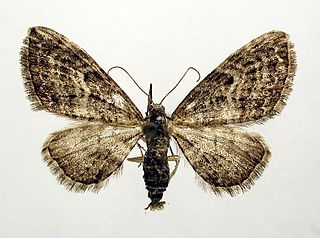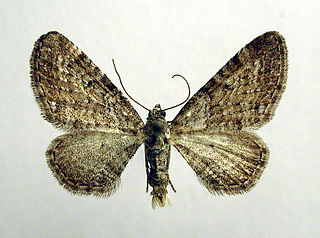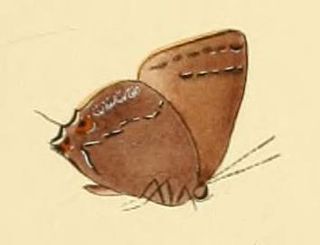
Stagira is a Greek village lying on a picturesque plateau on the Chalcidice peninsula, and standing at the foot of the Argirolofos hill. The village stands approximately 8 kilometers south southwest of the ancient Stageira, the birthplace of Aristotle, and a statue of him stands in it.

Stagira, Stagirus, or Stageira was an ancient Greek city whose site is located in the modern province of Central Macedonia, near the eastern coast of the peninsula of Chalkidice. It is chiefly known for being the birthplace of Aristotle, who was a Greek philosopher and polymath, a student of Plato and teacher of Alexander the Great. The city lies approximately 8 kilometres (5.0 mi) north northeast of the present-day village of Stagira, close to the town of Olympiada.

Eupithecia is a large genus of moths of the family Geometridae. There are hundreds of described species, found in all parts of the world, and new species are discovered on a regular basis.

The lime-speck pug is a moth of the family Geometridae. It is a common species throughout the Palearctic region, the Near East and North Africa.

The common pug(Eupithecia vulgata) is a moth of the family Geometridae. It is a common species across the Palearctic region, the Near East and North Africa. It ranges from the Atlantic coast of Ireland and Portugal across Europe, the Middle East and Central Asia to the Russian Far East (Priamurje) and Korea.

The juniper pug or juniper looper is a moth of the family Geometridae. The species was first described by Michael Denis and Ignaz Schiffermüller in 1775. It is found throughout the Palearctic and Nearctic regions and the Near East.

Christian Gottlob Neefe was a German opera composer and conductor.

Ammouliani, also known as Amoliani, is an island located in the Chalkidiki regional unit, Greece, 120 km (75 mi) from Thessaloniki. Administratively it is part of the municipal unit of Stagira-Akanthos. As of 2011, the resident population of the island was 547.

Stagira-Akanthos is a former municipality in Chalkidiki, Greece. Since the 2011 local government reform it is part of the municipality Aristotelis, of which it is a municipal unit. Population 8,705 (2011). The seat of the former municipality was in Ierissos, which is also the seat of the municipality Aristotelis. The land area of the municipal unit is 253.373 km². It lies north of the autonomous area of Mount Athos. The Greek philosopher Aristotle was born in the ancient city of Stageira, in the northwest part of the municipal unit.

Nea Roda is a village 115 km (71 mi) southeast of Thessaloniki, on the narrowest point of the Athos peninsula in the municipality of Stagira-Akanthos, Chalkidiki, Greece.

Eupithecia innotata, the angle-barred pug, is a moth of the family Geometridae. The species was first described by Johann Siegfried Hufnagel in 1767. It ranges from Spain in the west to western Siberia and Central Asia in the east.

The larch pug is a moth of the family Geometridae. The species can be found in Europe, the Ural Mountains, West and Central Siberia, the Altai Mountains, Transbaikalia, Yakutia, the Far East, Mongolia, Korea, Japan and in North America, from Yukon and Newfoundland to New York and Arizona.

Eupithecia simpliciata, the plain pug, is a moth of the family Geometridae. It is found in the Palearctic ecozone, from western Europe to north-western China (Xinjiang).

Eupithecia venosata, the netted pug, is a moth of the family Geometridae. It was first described by Johan Christian Fabricius in 1787. It is found across the Palearctic ecozone from Portugal and Morocco in the west to the Lake Baikal in Siberia and Afghanistan and Pakistan in the east.

Eupithecia pernotata, or Guenée's pug, is a moth of the family Geometridae. The species was first described by Achille Guenée in 1857. It is known from the Alps, through Romania to southern Russia. It is also found in Finland.

Aristotelis is a municipality in the Chalkidiki regional unit, Central Macedonia, Greece. The seat of the municipality is the town Ierissos. The municipality is named after the ancient philosopher Aristotle, whose birthplace, Stagira, lies within its bounds. The municipality also includes the area of the mining villages, known as Mademochoria.

Rekoa stagira, the smudged hairstreak or Stagira hairstreak, is a butterfly in the family Lycaenidae. It is found from Mexico south through Central America, including Nicaragua to Brazil.
Eupithecia variostrigata is a moth in the family Geometridae. It is widespread in the western Palaearctic, ranging from Spain to the western Pamirs in the east.
Stagira is a genus of cicadas in the family Cicadidae. There are at least 30 described species in Stagira.
Kafkanas is an island in the Aegean Sea, just off the town of Stagira. Anciently it was known as Caprus or Kapros, a name shared with Caprus, the port of ancient Stagira. While part of the Ottoman Empire, the island was known as Güllüce.














